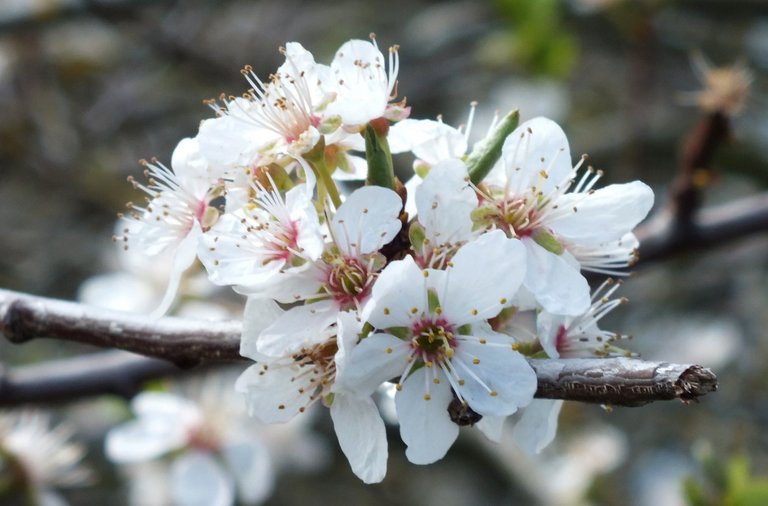Whereas I can't say I am much of a fan of "polarity" or "dualistic" thinking, I have to admit that it's fascinating how often people's choices... and — by extension — their philosophical/political leanings can be regarded through a lens of "either/or" categorization.

One of my — if you will — natural talents is pattern recognition. Pattern recognition is a fascinating field. On the surface, it seems self-evident enough and most people understand it. For example, we recognize the pattern that green strawberries are likely not ripe and sour, and red strawberries are ripe and sweet.
Extended pattern recognition is about seeing patterns within patterns within patterns, and seeing the correlations and non-correlations, and understanding which ones are causal and which are non-causal or coincidental. From years of observation, I pick really good strawberries because I see how the seeds are patterned and set on the berry, which tells me how much sun and water they got, and thus how naturally sweet they will be.
Often, we can use such very subtle patterns as accurate predictors of what's going to happen next, in the world, in communities, in companies, even in families and relationships.

Having worked a lot with the psychology of personality and archetypes, we also find that many people are bothered by the accuracy of predictive pattern recognition and will dismiss it... simply because they (aka their egos) are "offended" by the idea that something they value highly as their own unique attribute/skill/talent or "specialness" can actually be explained and predicted through patterns.
"I am offended by labels," can be very true... while also not rendering the label inaccurate.
Consider for example that the PREPARE-ENRICH program developed by the University of Minnesota Family Studies Unit and a similar metric developed by the Love Lab at the Gottman Institute in Seattle can predict with 90+ percent accuracy whether or not aspiring couples will succeed in marriage or end up divorcing — before these people tie the knot.
Yet most people reject such science because it offends our deeply rooted beliefs about love and happy marriages being matters of the heart and soul rather than predictable by science... the 90% accuracy rate notwithstanding.

But I'm digressing a bit... back to pattern recognition and such.
One of the reasons I never identified well with the traditionally "conservative" part of Texas where I lived for 20 years of my life wasn't really about direct political leanings, but about a differently pervasive pattern I found there: The importance of property placed (often far) above the importance of people.
Put in the bluntest sorts of terms "MY STUFF is more important than PEOPLE!"
Now, let's keep in mind that these opinions tend to fall along a spectrum. When we talk about something being a dominant characteristic, we often find that we have maybe 60% who identify with it and 40% who don't. It's not an absolute, it's a tendency.

Of course, the counterargument is that almost all people care deeply about their families, so what I'm saying here is basically bullshit!
Indeed, people do care about their families, but that's where the deeper pattern reveals itself... they tend to care in a way where the family "resembles property." The list of Important Things might include "My wife, my house, my kids, my power boat, my guns," and they all sit on the same psychological shelf. And it's a shelf that sits apart from the broader concept of "people," meaning human beings, in general.
I'm not even suggesting this to be an approach that's "good" or "bad," these are simply orientations towards life.
If you want to look at it from a slightly different angle, we could call it an "individualistic" vs a "collective" view of life.

Now, you might wonder what even prompted this rather strange post... and the truth of that is that it's here for my own self-indulgent and selfish reasons: An ongoing exploration of my pervasive tendency to be somewhat of a "fence sitter" who doesn't fit patterns well.
For example, I look at this stuff, and I would characterize myself as a "Collective Individualist." The Either/Or metric doesn't work for me.
Meaning that I value the collective being well and healthy, because when the collective is well and healthy, it won't need to come bother and threaten — aside from instances of mental illness — my individual "stuff." You might characterize it as "self-serving altruism," or the recognition that as an "individual" I'm not just a single independent point, but an integral part of a greater system.

We could even consider such a system as our own Hive community. When I take actions in such a way that it benefits all of Hive, it is ultimately to my own benefit. I am working both for the betterment of the community as well as for my personal benefit.
I believe excessive emphasis on PROPERTY (and associated rights) tends to dehumanize and disenfranchise PEOPLE (and associated rights) and excessive emphasis on PEOPLE tends to devalue the importance of PROPETRY and INDIVIDUALITY.
Hence, neither being a "righty" or a "lefty" offers a comprehensive and functional approach to solving the world's problems.
Thanks for reading, and I hope you had a great weekend!
What do YOU think? Comments, feedback and other interaction is invited and welcomed! Because — after all — SOCIAL content is about interacting, right? Leave a comment — share your experiences — be part of the conversation!
Greetings bloggers and social content creators! This article was created via PeakD, an application that's part of the Hive Social Content Experience. If you're a blogger, writer, poet, artist, vlogger, musician or other creative content wizard, come join us! Hive is a little "different" because it's not run by a "company;" it operates via the consensus of its users and your content can't be banned, taken down or demonetized. And that counts for something, these days! So if you're ready for the next generation of social content where YOU retain ownership and control, come by and learn about Hive and make an account!


(As usual, all text and images by the author, unless otherwise credited. This is original content, created expressly and uniquely for this platform — NOT cross posted anywhere else!)
Created at 20200809 13:58 PDT
0096/1324
I feel similarly about patterns, and I'm glad to finally realise why all the sweetest strawberries are missing, by the time I get out there.
The people oriented heavily toward the sanctity of property, are they similarly concerned with the sanctity of other people's property?
If so, I see no issue here. If a guy with a 'Trespassers will be shot' sign on his fence finds a wallet on the street and tracks down the owner; that's a universal respect for everybody's property; making the property/people distinction a little more complex.
I see people have a variety of approaches towards property... but in so many instances we end up with a variation on what comedian George Carlin used to say: "MY shit is STUFF, and other people's stuff is SHIT," basically suggesting there's often a dichotomy there. I remember when I lived in Texas many moons ago, well-educated adults agreeing that if they caught someone trying to steal their car stereo, they'd gladly shoot that person DEAD. Theft notwithstanding, the message was that a $200 car stereo held more "value" than the taking of a life.
I'm sure they'd say they were just honouring the thief's valuation of their own life.
Ah, yeah.
Well, what's mine is mine.
What's yours is mine.
Not so sure that I'm going to jump on the "science is better at knowing" what my heart says.
We're proof of that already.
The exception that proves the rule perhaps?
OR we might have discovered that the science would have agreed that we had the right stuff... oftentimes the heart AND science can be in agreement.
I think the people vs. property divide is a false dichotomy when properly understood. Disrespect for justly-acquired property is inherently disrespect for the people whose voluntary exchange or homesteading effort acquired that property. If I produce something, and you take it without my consent, you are claiming ownership over me as well. People who say, "you value your property over other people" tend to be justifying their disrespect for the person whose property they intend to plunder.
That said, there are plenty of examples of people who claim property rights as justification for abusing others, too. People like to claim property rights in things that are not properly property, like nationalist symbols and "intellectual property."
Collectives formed voluntarily are one thing. Collectives imposed without consent are another entirely.
Agreed... but then we get into a whole different discussion over the voluntary and well-informed ideal, vs. the world in which we actually live, which tends to be filled with manipulation, coercion and abuse. Which I think is the gist of what you're suggesting here.
We live in a world with rape and murder. Do we strive for the ideal despite the chaos, or embrace coercion while citing that chaos as justification, imagining we can somehow thereby create order?
Here's that #posh thing for the world to see:
Twitter: